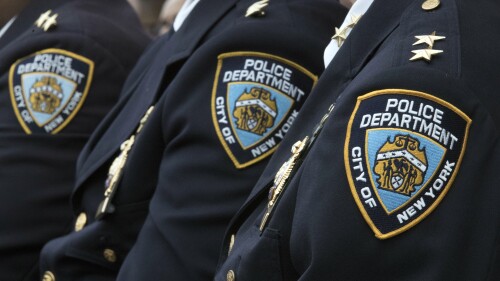By Dylan Lovan
Associated Press
LOUISVILLE, Ky. — A federal judge has thrown out major felony charges against two former Louisville officers accused of falsifying a warrant that led police to Breonna Taylor’s door before they fatally shot her.
U.S. District Judge Charles Simpson’s ruling declared that the actions of Taylor’s boyfriend, who fired a shot at police the night of the raid, were the legal cause of her death, not a bad warrant.
Federal charges against former Louisville Police Detective Joshua Jaynes and former Sgt. Kyle Meany were announced by U.S. Attorney General Merrick Garland in 2022 during a high-profile visit to Louisville. Garland accused Jaynes and Meany, who were not present at the raid, of knowing they had falsified part of the warrant and put Taylor in a dangerous situation by sending armed officers to her apartment.
But Simpson wrote in the Tuesday ruling that “there is no direct link between the warrantless entry and Taylor’s death.” Simpson’s ruling effectively reduced the civil rights violation charges against Jaynes and Meany, which had carried a maximum sentence of life in prison, to misdemeanors.
The judge declined to dismiss a conspiracy charge against Jaynes and another charge against Meany, who is accused of making false statements to investigators.
When police carrying a drug warrant broke down Taylor’s door in March 2020, her boyfriend, Kenneth Walker, fired a shot that struck an officer in the leg. Walker said he believed an intruder was bursting in. Officers returned fire, striking and killing Taylor in her hallway.
Simpson concluded that Walker’s “conduct became the proximate, or legal, cause of Taylor’s death.”
“While the indictment alleges that Jaynes and Meany set off a series of events that ended in Taylor’s death, it also alleges that (Walker) disrupted those events when he decided to open fire” on the police, Simpson wrote.
Walker was initially arrested and charged with attempted murder of a police officer, but that charge was later dropped after his attorneys argued Walker didn’t know he was firing at police.
An email message sent to the U.S. Justice Department seeking comment was not immediately returned Friday morning.
A third former officer charged in the federal warrant case, Kelly Goodlett, pleaded guilty in 2022 to a conspiracy charge and is expected to testify against Jaynes and Meany at their trials.
Federal prosecutors alleged Jaynes, who drew up the Taylor warrant, had claimed to Goodlett days before the warrant was served that he had “verified” from a postal inspector that a suspected drug dealer was receiving packages at Taylor’s apartment. But Goodlett knew that was false and told Jaynes the warrant did not yet have enough information connecting Taylor to criminal activity, prosecutors said. She added a paragraph saying the suspected drug dealer was using Taylor’s apartment as his current address, according to court records.
Two months later, when the Taylor shooting was attracting national headlines, Jaynes and Goodlett met in Jaynes’ garage to “get on the same page” before Jaynes talked to investigators about the Taylor warrant, court records said.
A fourth former officer, Brett Hankison, was also charged by federal prosecutors in 2022 with endangering the lives of Taylor, Walker and some of her neighbors when he fired into Taylor’s windows. A trial last year ended with a hung jury, but Hankison is scheduled to be retried on those charges in October.







